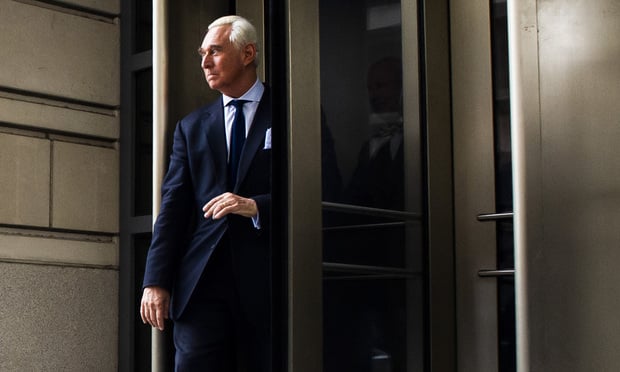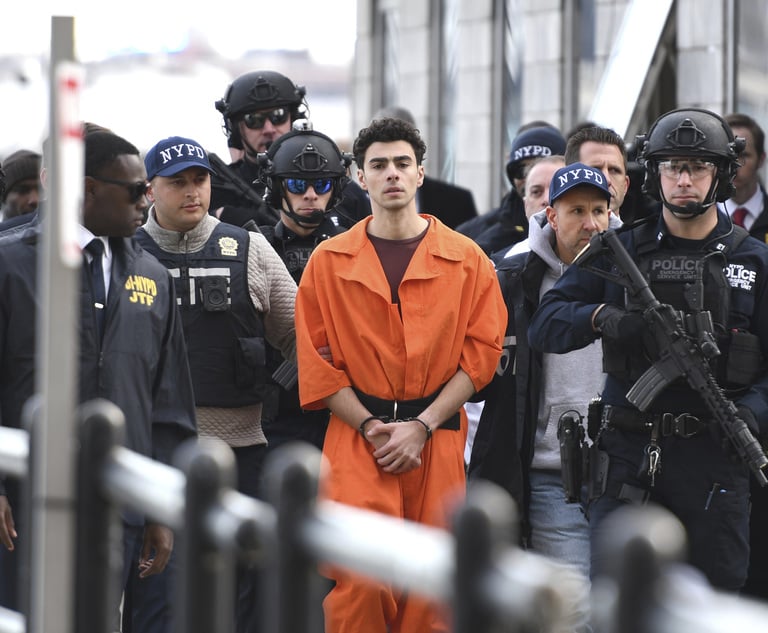Roger Stone's Lawyers Offer Final Defense to Jurors: 'So What?'
The jury is expected to begin deliberations Thursday.
November 13, 2019 at 04:56 PM
6 minute read
 Roger Stone, indicted by the team of Special Counsel Robert Mueller, departs federal court after attending his arraignment. Photo: Diego M. Radzinschi / NLJ
Roger Stone, indicted by the team of Special Counsel Robert Mueller, departs federal court after attending his arraignment. Photo: Diego M. Radzinschi / NLJWhen it comes to Roger Stone's contacts with the Trump campaign about WikiLeaks in 2016, Stone's attorney had a clear message: "So what?"
That's the argument defense attorney Bruce Rogow made to the jury during closing arguments for Stone's trial on Wednesday. Rogow said Stone had no reason to lie to the House Intelligence Committee during his closed-door interview with lawmakers in 2017.
"He has no motive to lie because protecting the campaign is a nonissue," Rogow said, noting that Stone testified months after the campaign ended.
"There could be no sensible motive in trying to protect the campaign when the campaign was long since over, and Mr. Trump was the president of the United States," he added.
Protecting Trump's 2016 campaign is the motive prosecutors have offered since the trial started last week.
But Rogow argued Wednesday the story was far more complicated than that. He said Stone was trying to comply with the criteria of the House Intelligence Committee's Russia probe during his testimony. That criteria, which laid out the scope of the investigation on Russian interference in the 2016 election, did not specifically mention WikiLeaks. Stone was interviewed by the committee as part of that probe.
"The committee set the rule and Roger Stone tried to comply with that rule over and over again," Rogow said.
Rogow returned to the argument he made to the jury during his opening statement, that jurors have to consider Stone's "state of mind" when he was testifying with the House Intelligence Committee.
"What we got here is failure to communicate," Rogow told the jury, quoting the movie "Cool Hand Luke." And he placed the blame for Stone's remarks on the committee and its parameters, which focused on Russian election interference.
Rogow was further dismissive of the government's charge of witness tampering against Stone, and its claim that Stone pressured his associate Randy Credico to not submit to an interview with lawmakers.
Rather, Rogow argued, Credico "played" Stone by convincing Stone he had inside information on WikiLeaks. And he described Credico as the kind of person who can't be trusted, meaning that the jury couldn't rely on him to convict Stone.
"These two guys tampered with one another for 20 years, over all kinds of crazy things," Rogow said.
During his closing argument, prosecutor Jonathan Kravis walked the jury through the five categories of lies the government alleges Stone made during his 2017 testimony with the House Intelligence Committee.
He played the audio of Stone making the alleged false statements, and then pulled up evidence, such as emails and texts sent between Stone and his associates, that contradicted Stone's remarks.
Kravis referred to two of Stone's alleged lies—that Stone didn't have documents about his contacts on WikiLeaks, and that Stone didn't discuss WikiLeaks head Julian Assange with third parties—as "whoppers."
And he referenced Stone's comments to the House Intelligence Committee claiming that he didn't text or email much, and that he only communicated with his intermediary during phone calls.
"No text messages? Not an email guy?" Kravis said. "Are you kidding me?" The prosecutor then pulled up a chart showing Stone exchanged more than 70 texts with Credico alone on the day of Stone's testimony with the House Intelligence Committee.
As for the witness-tampering charge against Stone, Kravis argued that Stone knew Credico was the "one guy out there who can knock down this whole house of cards." As a result, the prosecutor claimed that Stone repeatedly pressured Credico not to testify, telling Credico to assert his Fifth Amendment rights and to "do a Frank Pentangeli," in reference to "The Godfather: Part II" character who lies to a congressional committee.
Kravis also offered up evidence that Stone interfered with the House Intelligence Committee's Russia probe by lying. He said the committee's final Russia report was inaccurate and incomplete, and that lawmakers were blocked from accessing witnesses such as Credico and Corsi as a result of Stone's actions.
Federal prosecutor Michael Marando also delivered an animated response to Rogow's closing argument. He said that Stone's lies were clearly laid out in the written evidence they presented in the case, including dozens of Stone's own texts and emails to other people.
"You know the great thing about a document?" Marando told the jury. "A document doesn't lie."
And Marando offered a strong rebuke to Rogow's assertion of "so what."
"Well, if that's the state of affairs that we're in, I'm pretty shocked," Marando said. "Truth still matters."
"In our institutions, in courts of law and committee hearings, truth still matters. And Mr. Stone came in, and he lied to Congress," Marando continued. "He obstructed their investigation and he tampered with a witness and that matters. And you don't look at that, and you say, 'so what.'"
At the end of closing arguments, U.S. District Judge Amy Berman Jackson sent the jury home for the day, saying she will deliver the jury instructions Thursday morning. The jury will begin deliberations after that.
The jury heard evidence and testimony from witnesses for less than four days during the trial.
The government called up key figures from the Trump campaign to testify, such as former Trump campaign head Steve Bannon and ex-deputy campaign chairman Rick Gates. Bannon's testimony ultimately played down just how seriously he took Stone's information about forthcoming WikiLeaks releases.
But Gates' testimony Tuesday painted a much more damning picture for Trump, as he testified that Trump and Stone were in touch about potential upcoming dumps of hacked emails damaging to the Clinton campaign.
Credico also took the stand, maintaining he was not Stone's intermediary to WikiLeaks. Credico recounted messages he sent Stone, warning he was committing perjury by naming Credico as the WikiLeaks backchannel.
However, Stone's attorneys did not call any witnesses for the defense. Rather, they allowed the jury to listen to roughly 50 minutes of audio from Stone's testimony before the House Intelligence Committee in 2017, during which Stone is alleged to have made false statements.
They also submitted into evidence more than 70 exhibits from both the government and their team, but did not discuss them openly with the jury. Jurors will be able to examine the documents during their deliberations.
Read more:
Lawyers' Private Talks With Judge at Roger Stone Trial Offer Hints About Their Tactics
No Bleeping Required: Jury Gets Uncensored Look at Roger Stone's Messages
Roger Stone's Lawyers Unveil Their Defense: He Didn't Mean to Lie
Steve Bannon Expected to Appear as Government Witness in Roger Stone's Trial
This content has been archived. It is available through our partners, LexisNexis® and Bloomberg Law.
To view this content, please continue to their sites.
Not a Lexis Subscriber?
Subscribe Now
Not a Bloomberg Law Subscriber?
Subscribe Now
NOT FOR REPRINT
© 2025 ALM Global, LLC, All Rights Reserved. Request academic re-use from www.copyright.com. All other uses, submit a request to asset-and-logo-licensing@alm.com. For more information visit Asset & Logo Licensing.
You Might Like
View All
11th Circuit Rejects Trump's Emergency Request as DOJ Prepares to Release Special Counsel's Final Report
3 minute read
Special Counsel Jack Smith Prepares Final Report as Trump Opposes Its Release
4 minute read
Luigi Mangione Charged in Federal Court for Stalking, Murder and Firearms Offenses

Luigi Mangione Indicted on Charges Including First-Degree Murder in Shooting of Health Insurance CEO
Trending Stories
- 1'It's Not Going to Be Pretty': PayPal, Capital One Face Novel Class Actions Over 'Poaching' Commissions Owed Influencers
- 211th Circuit Rejects Trump's Emergency Request as DOJ Prepares to Release Special Counsel's Final Report
- 3Supreme Court Takes Up Challenge to ACA Task Force
- 4'Tragedy of Unspeakable Proportions:' Could Edison, DWP, Face Lawsuits Over LA Wildfires?
- 5Meta Pulls Plug on DEI Programs
Who Got The Work
Michael G. Bongiorno, Andrew Scott Dulberg and Elizabeth E. Driscoll from Wilmer Cutler Pickering Hale and Dorr have stepped in to represent Symbotic Inc., an A.I.-enabled technology platform that focuses on increasing supply chain efficiency, and other defendants in a pending shareholder derivative lawsuit. The case, filed Oct. 2 in Massachusetts District Court by the Brown Law Firm on behalf of Stephen Austen, accuses certain officers and directors of misleading investors in regard to Symbotic's potential for margin growth by failing to disclose that the company was not equipped to timely deploy its systems or manage expenses through project delays. The case, assigned to U.S. District Judge Nathaniel M. Gorton, is 1:24-cv-12522, Austen v. Cohen et al.
Who Got The Work
Edmund Polubinski and Marie Killmond of Davis Polk & Wardwell have entered appearances for data platform software development company MongoDB and other defendants in a pending shareholder derivative lawsuit. The action, filed Oct. 7 in New York Southern District Court by the Brown Law Firm, accuses the company's directors and/or officers of falsely expressing confidence in the company’s restructuring of its sales incentive plan and downplaying the severity of decreases in its upfront commitments. The case is 1:24-cv-07594, Roy v. Ittycheria et al.
Who Got The Work
Amy O. Bruchs and Kurt F. Ellison of Michael Best & Friedrich have entered appearances for Epic Systems Corp. in a pending employment discrimination lawsuit. The suit was filed Sept. 7 in Wisconsin Western District Court by Levine Eisberner LLC and Siri & Glimstad on behalf of a project manager who claims that he was wrongfully terminated after applying for a religious exemption to the defendant's COVID-19 vaccine mandate. The case, assigned to U.S. Magistrate Judge Anita Marie Boor, is 3:24-cv-00630, Secker, Nathan v. Epic Systems Corporation.
Who Got The Work
David X. Sullivan, Thomas J. Finn and Gregory A. Hall from McCarter & English have entered appearances for Sunrun Installation Services in a pending civil rights lawsuit. The complaint was filed Sept. 4 in Connecticut District Court by attorney Robert M. Berke on behalf of former employee George Edward Steins, who was arrested and charged with employing an unregistered home improvement salesperson. The complaint alleges that had Sunrun informed the Connecticut Department of Consumer Protection that the plaintiff's employment had ended in 2017 and that he no longer held Sunrun's home improvement contractor license, he would not have been hit with charges, which were dismissed in May 2024. The case, assigned to U.S. District Judge Jeffrey A. Meyer, is 3:24-cv-01423, Steins v. Sunrun, Inc. et al.
Who Got The Work
Greenberg Traurig shareholder Joshua L. Raskin has entered an appearance for boohoo.com UK Ltd. in a pending patent infringement lawsuit. The suit, filed Sept. 3 in Texas Eastern District Court by Rozier Hardt McDonough on behalf of Alto Dynamics, asserts five patents related to an online shopping platform. The case, assigned to U.S. District Judge Rodney Gilstrap, is 2:24-cv-00719, Alto Dynamics, LLC v. boohoo.com UK Limited.
Featured Firms
Law Offices of Gary Martin Hays & Associates, P.C.
(470) 294-1674
Law Offices of Mark E. Salomone
(857) 444-6468
Smith & Hassler
(713) 739-1250










